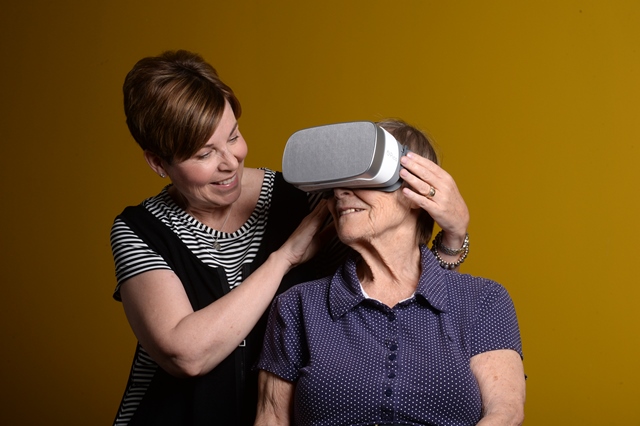It’s no secret that point-of-care staff have a deep understanding of the needs of older adults. Care professionals like nurses, social workers, physicians, personal support workers, and arts and recreation therapists who work with older adults often improvise to meet the growing demands of an aging demographic – and hold key insights into what can be improved in seniors’ care.
As the Canadian population ages, those unique insights are needed now more than ever in order to improve the lives of older adults with dementia and their care partners. The Centre for Aging + Brain Health Innovation (CABHI), powered by Baycrest, invites point-of-care staff to apply to the 2019 Spark program to bring their innovative ideas to life.
CABHI’s Spark program empowers point-of-care staff to translate their grassroots ideas into novel innovations in the field of aging and brain health that can improve the quality of life of older adults living with dementia and their care partners.
The program provides up to $50,000 (CAD) per project over 12 months to develop and refine early-stage solutions or adapt and test a commercially available solution in a real-world environment. CABHI invites staff working at Canadian healthcare organizations and members of the Seniors’ Quality Leap Initiative (SQLI) to apply for funding. In total, up to $2.5 million is available across all projects.
This year, the Spark program is accepting applications aimed at addressing one of five priorities:
- Aging in place: solutions that enable older adults with dementia to maximize their independence so that they can age in their desired setting (e.g. by reducing falls, addressing social isolation, etc.)
- Caregiver support: solutions that support caregivers (formal and informal) in providing care to older adults with dementia
- Care coordination and navigation: solutions that help older adults, caregivers and healthcare providers to better coordinate and navigate care for older adults with dementia
- Cognitive health: solutions that improve brain/cognitive health for aging adults and/or support the identification and assessment of adults at risk for dementia/cognitive impairment
- Aging Indigenous and rural populations: solutions that address aging and brain health challenges particularly focusing on Indigenous populations and individuals living in rural and remote areas
Successful Spark program applicants will have an opportunity to participate in CABHI’s new Spark+ Curriculum, a four-module acceleration curriculum which will run in parallel to the project and help guide project leads toward a plan for success and sustainability.
The Spark program also provides access to end-user focus groups and CABHI’s acceleration services in business development, knowledge mobilization, commercialization, and marketing and communications.
Past Spark innovations include:
- Toronto HEARS, a community-based hearing program for at-risk seniors
- Prescribing VR (Virtual Reality), a project team that used VR technology to expose people with dementia to simulated natural environments to decrease depression, anxiety, and stress
- Mindfulness intervention groups for caregivers of patients with Alzheimer’s
- Aging Out, a program that disseminates best practices in LGBTQ aging, health, and dementia care across seniors’ care organizations
Interested? Eligible applicants are invited to submit an expression of interest by 5 p.m. EDT on Friday, July 5, 2019. Apply and learn more about the Spark program at www.cabhi.com.
Rebecca Ihilchik is the Marketing & Communications Specialist at The Centre for Aging + Brain Health Innovation (CABHI).


